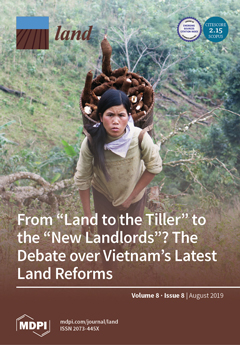Resources
Displaying 1681 - 1685 of 2258Reflections on How State–Civil Society Collaborations Play out in the Context of Land Grabbing in Argentina
We examine collaborations between the state and civil society in the context of land grabbing in Argentina. Land grabbing provokes many governance challenges, which generate new social arrangements. The incentives for, limitations to, and contradictions inherent in these collaborations are examined. We particularly explore how the collaborations between the provincial government of Santiago del Estero and non-government organizations (NGOs) played out. This province has experienced many land grabs, especially for agriculture and livestock production.
An Assessment of Multiple Drivers Determining Woody Species Composition and Structure: A Case Study from the Kalahari, Botswana
Savannas are extremely important socio-economic landscapes, with pastoralist societies relying on these ecosystems to sustain their livelihoods and economy. Globally, there is an increase of woody vegetation in these ecosystems, degrading the potential of these multi-functional landscapes to sustain societies and wildlife. Several mechanisms have been invoked to explain the processes responsible for woody vegetation composition; however, these are often investigated separately at scales not best suited to land-managers, thereby impeding the evaluation of their relative importance.
Possession and Precedence: Juxtaposing Customary and Legal Events to Establish Land Authority
Land restitution carries implicit recognition of some previous claim to ownership, but when are first claims recognized? The concepts of first possession and original acquisition have long been used as entry points to Western concepts of property. For Austronesia, the concept of precedence is used in customary systems to justify and describe land claims and Indigenous authority. Conflict and political change in Timor-Leste have highlighted the co-existence of multiple understandings of land claims and their legitimacy.
Land of Plenty, Land of Misery: Synergetic Resource Grabbing in Mozambique
Global climate change policy enforcement has become the new driving force of resource grabbing in the context of the “scramble of resources” in Africa. Nevertheless, the environmental crisis should not be seen as an isolated phenomenon amid contemporary capitalism. On the contrary, a very distinct feature of the current wave of land grabs is the convergence of multiple crises, including food, energy/fuel, environmental, and financial. The Southern Mozambique District, Massingir, is an area with high potential regarding water sources and biodiversity.
From “Land to the Tiller” to the “New Landlords”? The Debate over Vietnam’s Latest Land Reforms
Between Vietnam’s independence and its reunification in 1975, the country’s socialist land tenure system was underpinned by the principle of “land to the tiller”. During this period, government redistributed land to farmers that was previously owned by landlords. The government’s “egalitarian” approach to land access was central to the mass support that it needed during the Indochinese war.


